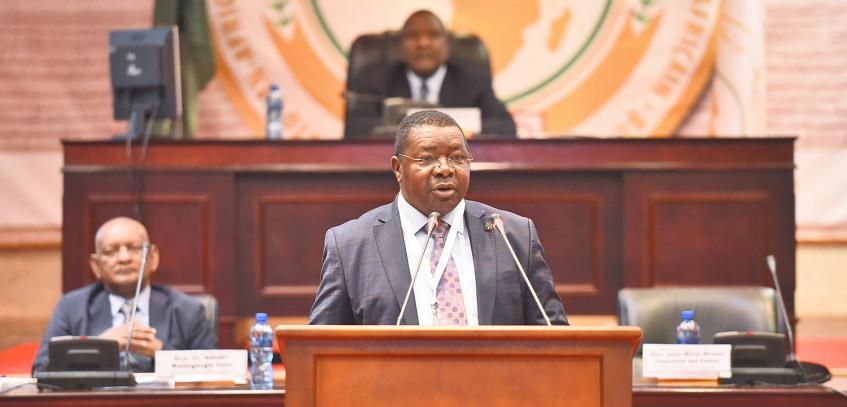African Peer Review Mechanism (APRM) says it is confident of the strong commitment of Parliaments at the Continental, National and Sub-regional levels in ensuring its success.
This was disclosed by Mr. Ferdinand Katendeko, Director of Operations while making a presentation on the APRM and its processes on behalf of Prof Eddy Maloka at the ongoing first Ordinary Session of the Sixth Parliament of the PAP in Midrand, South Africa held under the African Union theme for 2022, “Building resilience in nutrition on the African continent: Accelerate the human capital, social and economic development”.
The APRM is an autonomous organ of the African Union (AU), voluntarily acceded to by member states of the AU. The primary purpose of the APRM is to foster the adoption of policies, standards and practices that lead to political stability, high economic growth, sustainable development and accelerated economic integration, in line with the NEPAD strategic framework goals.
It also has five areas reviewed which are Democracy and Political Governance, Economic Management and Governance, Corporate Governance, Broad-based Socio-economic Development and State Resilience to Shocks and Disasters.
During his presentation Katendeko focused on the APRM mandate and process, Member States, the Review Process, APRM Governance Structures, African Governance Report, Value Added to Governance by APRM and the Role of Parliaments in APRM processes and the Role of the Continental Parliament.
Katendeko also underscored that the PAP should promote transnational peer learning- share experiences among countries.
“The PAP has key roles to play as a Continental Parliament,” he said.
“It needs to provide opportunities for tabling APRM reports during PAP ordinary sessions with a view to generating debates on APRM best practices of the Mechanism at the continent by stimulating non-participating countries to join. PAP must also establish parliamentary Committees to monitor the implementation of the National Programme of Action in the participating countries and encourage all AU member countries to accede to APRM to foster the APRM country review process.”
Meanwhile, Katendeko further mentioned that the APRM expressed confidence in the roles played by parliaments.
“APRM relies on Parliaments to participate in Review processes, especially in the ongoing Unconstitutional Change of Governments (UCG). We also rely on the ability of Parliaments to influence government decisions and policies by passing legislation and mobilizing support for the APRM process as well as participating in sensitisation on APRM.
“APRM is also sure that Parliaments will fulfil their mandate of implementing the National Programme of Action in APRM member states,” he added highlighting that the APRM further hopes that partnership between parliaments and APRM will continue to foster respect for the rule of law, and create a conducive environment to fulfil their legitimate aspirations for stability, sustainable economic and social development based on good governance.
Meanwhile, H.E. Hon. Chief Fortune Charumbira applauded the APRM for developing a detailed presentation.
“We are very delighted as PAP for this presentation you brought to us. It is very catchy and detailed. I am pleased with the response to it; the live participation by fellow parliamentarians towards this presentation says a lot. This appetite towards this presentation shows that we still need more time to interact and engage with you as APRM. We will see to it that you are invited again next year as parliamentarians seem to want more from you,” said H.E. Hon. Charumbira.
-Ends-








